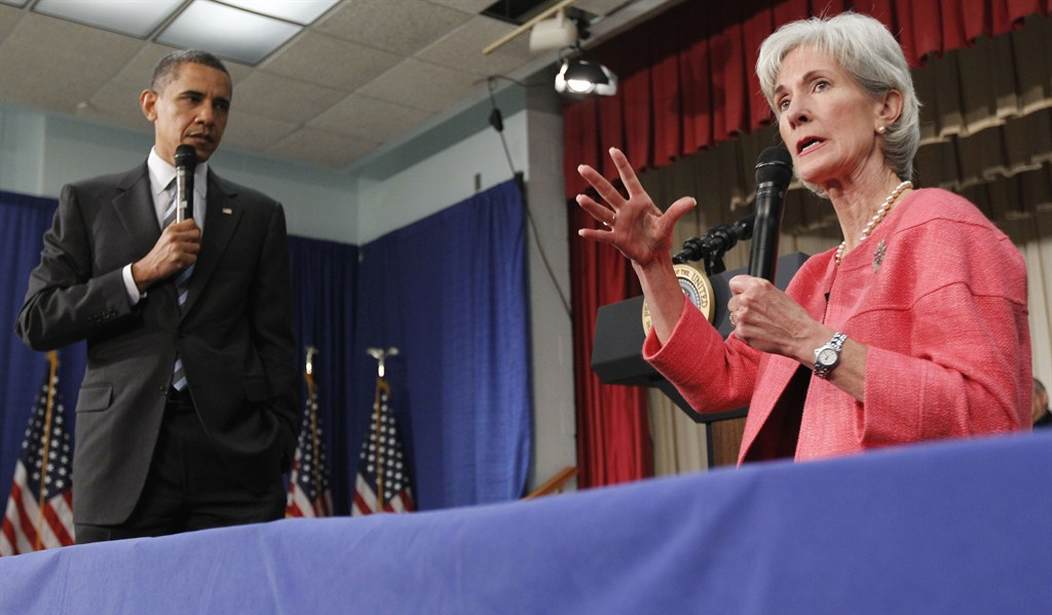If you missed my post yesterday morning, be sure to give it a quick read before moving on to the Washington Post's dismal assessment of Obamacare's readiness. With just one week to go until the implementation deadline (at least of the parts that haven't already been unilaterally delayed because they're completely unready), things are looking dodgy. The law's small business exchanges -- which have been delayed and dramatically scaled back -- are coming along exactly as you might expect:
This summer, officials announced that the federal government’s small business portal will not allow employers the same flexibility business owners will have in the District. For the first year, employers will have to choose a single plan for their entire company, rather than the multiple-plan option lawmakers envisioned. More importantly, software glitches on the federal exchange are making it difficult for the Web site to “reliably determine how much people need to pay for coverage,” according to a report last week by The Wall Street Journal. In response, Joel Ario, a former HHS official who oversaw health exchange matters at the agency, told The Post’s Sarah Kliff that “nobody is going to say we’re not starting on October 1, but in some situations, you may see a redefinition of what ‘start’ means.”
Among the administration's on-the-fly changes to the program was the decision that for at least one year, employees obtaining coverage through the small business exchanges will be limited to just one "option." (The same is true for individuals and families in New Hampshire, where only one insurer is participating in the exchange). Americans should get accustomed to limited choices and access under Obamacare. The New York Times follows-up on the Los Angeles Times' reportage on the new law's attempt at mitigating premium spikes by making actual care a lot harder to come by:
Federal officials often say that health insurance will cost consumers less than expected under President Obama’s health care law. But they rarely mention one big reason: many insurers are significantly limiting the choices of doctors and hospitals available to consumers. From California to Illinois to New Hampshire, and in many states in between, insurers are driving down premiums by restricting the number of providers who will treat patients in their new health plans. When insurance marketplaces open on Oct. 1, most of those shopping for coverage will be low- and moderate-income people for whom price is paramount. To hold down costs, insurers say, they have created smaller networks of doctors and hospitals than are typically found in commercial insurance. And those health care providers will, in many cases, be paid less than what they have been receiving from commercial insurers. Some consumer advocates and health care providers are increasingly concerned. Decades of experience with Medicaid, the program for low-income people, show that having an insurance card does not guarantee access to specialists or other providers.
Recommended
First of all, "less than expected" is different than "less" -- which is what we were promised on costs. A lot less, in fact. National Journal's independent analysis has determined that the "vast majority" of individuals in Obamacare exchanges will experience premium increases. But "access shock" will be a real problem for many low- and middle-income Americans. Coverage does not equate to care; fewer providers and reduced reimbursement rates a recipe for rationing and delayed doctor visits or surgeries. Nancy Pelosi can prattle on about "messaging" shortcomings until the cows come home -- Obamacare's problem is the substance, not the sales pitch. I'll leave you with more "anecdotal evidence," as the White House would call it, about the new law's deleterious effect on hiring and the US economy:
With open enrollment for Obamacare about to begin, small- and medium-sized businesses are not hiring because of uncertainty surrounding the implementation of the law, the CEO of nation's fifth-largest staffing company said on Monday. "Companies are really not interested in hiring full-time people. That's really the issue with Obamacare," Express Employment Professionals boss Bob Funk told CNBC's "Squawk Box" on Monday. Funk, a former chairman of the Kansas City Federal Reserve, admitted that this trend is a "boon" for his business, but "not healthy for the country as a whole."
Quote: "There is no serious evidence" that Obamacare is "holding back economic growth."

























Join the conversation as a VIP Member